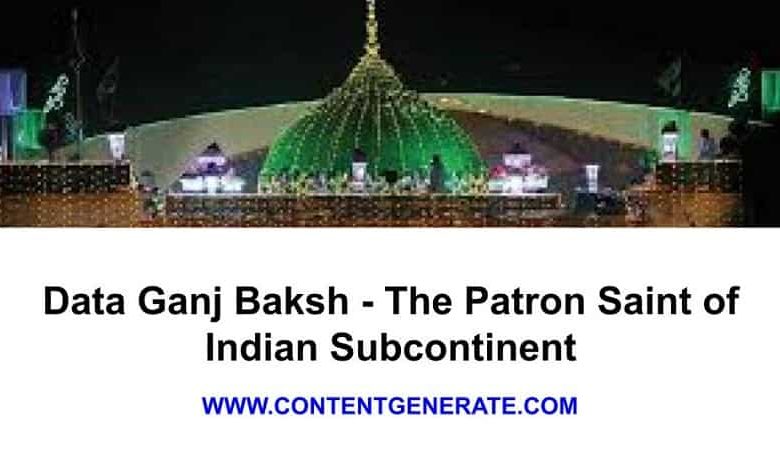Data Ganj Baksh – The Patron Saint of Indian Subcontinent

This post gives a brief but comprehensive account of the life of Hazrat Data Ganj Baksh (1009-1072).
Contents
Background
When it comes to Sufism and the role of Sufi saints in the spread of Islam, the name of Data Ganj Baksh will always come on the top.
The original name of Hazrat Data Ganj Baksh was Abdul Hasan Ali. He is also known as Shaikh Syed ʿAli al-Hujwiri but he was popularly known as Data Ganj Bakhsh among his devotees which means the Bestower of Treasures. He was born in Ghazni, Afghanistan in 990 AD where he grew as one of the greatest Persian Muslim Mystic and theologians. The great saint is said to have come to Lahore with Sultan Mahmood, the son of Mahmood Ghazni in AH 431.
Role in the spread of Islam in India
Hazrat Data Ganj Baksh played an important role in the spread of Islam in India in particular and South Asia in general. He preached Islam and taught Islamic teaching thereby converting a huge number of people to Islam. For this reason, historians consider him as one of the most important figures to have spread Islam in the Indian subcontinent. His devotees, both Muslims and non-Muslims, revered him as the Patron saint in Pakistan and the whole Indian subcontinent.
Literary works of Data Ganj Baksh
The most famous literary work on Sufism for which Hazrat Data Ganj Baksh is “Kashf al Mahjub” which means “Unveiling of the Hidden” in Persian. Scholars consider ‘Kashf al Mahjub’ as the earliest formal treatise on Sufism in Persian.
In this book, Data Sahib introduces different aspects of Sufism. He also gives detailed accounts of the prominent Sufi saints of his time and those who preceded him. The book is the only literary work of Data sahib which remains until today.
Kashf-al-Asrar
Kashf al Asrar was another classic literary work of Hazrat Data Ganj Baksh which unfortunately does not exist today. In this book, Data Sahib narrated how to adopt Sufism in the true sense.
Other works
Data Sahib wrote a number of books on Sufism before and after his settlement in Lahore. Unfortunately, these works no longer exist. A list of the unpreserved literary work of Data Sahib on Sufism is as follows:
1. Diwan, a collection of Data Sahib’s verses.
2. Minjaj al-Din, a treatise on the greatest Sufis.
3. Asrar al-khiraq wa ‘l-ma’unat, a book of Data Sahib about the use of wool as part of the clothes worn by Sufis.
4. A book without a title in which the great saint explains the message carried by the sayings of Mansur al-Hallaj.
5. Kitab al-bayan li-Ahl al-iyan, a book explaining the Sufi concept of Fana.
Death, shrine, and Urs
There is a contradictory opinion about the date of the death of Hazrat Data Ganj Bakhsh. According to some sources it was 1072 whereas according to some other accounts it was 1077. He passed away in Lahore where he was laid to rest. A shrine was built on his tomb, popularly known as Data Darbar. Data darbar is the largest shrine of any Sufi saint in Pakistan at present both in terms of the number of visitors and size of the building. The shrine’s management, maintenance, and all other related events are the responsibility of the department of Awkaf after its nationalization back in 1960.




